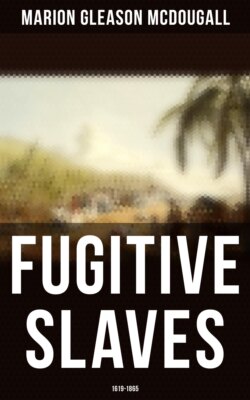Читать книгу Fugitive Slaves (1619-1865) - Marion Gleason McDougall - Страница 19
На сайте Литреса книга снята с продажи.
Arguments for the Bill.
Оглавление§ 31. Arguments for the bill.—The debate on the Fugitive Slave Bill more than any other part of the Compromise illustrates the character of the slavery conflict. Most of the Southern members urged the immediate necessity of a new law, but some of the more ardent considered the evil to be one which could be reached only through a change in public sentiment, and they thought all legislation valueless.161 Mr. Mason thus presented the evils with which the law must cope. He stated that the border States had found it an impossibility to reclaim a fugitive when he once got within the boundaries of a non-slaveholding State; "and this bill, or rather the amendments, … have been framed with a great deal of consideration, to reach, if practicable, the evils which this experience has demonstrated to exist, and to furnish the appropriate remedy in enabling the owner of a fugitive to reclaim him." Under the existing laws, "you may as well go down into the sea and endeavor to recover from his native element a fish which has escaped from you, as expect to recover such a fugitive. Every difficulty is thrown in your way by the population. … There are armed mobs, rescues. This is the real state of things."162
Not only were the laws thus set aside by individuals, but also through the Underground Railroad an organized system of depredation was carried on, whereby thousands of dollars were every year lost to the slaveholder.163 As an illustration of the extent to which this disregard of law was carried, Mr. Yulee, one of the most extreme of the Southern men, instanced a convention which was then in session in New York "for the very purpose, openly avowed, of congratulation upon their successful violation of the Constitution in respect to fugitives, and to devise ways and means to encourage the escape of slaves."164
Such, according to the Southern Congressmen, was the condition of affairs. They then proceeded to contrast it with the situation as contemplated by the Constitution, and supported by the decision of the Supreme Court in the Prigg case. Mr. Butler insisted that this bill required "nothing more than is enjoined by the Constitution, and which contains the bond of union and the security of harmony; and in the name of Washington, I would invoke all parties to observe, maintain, and defend it." He said it was the handiwork of sages and patriots, and resulted from intelligent concessions, for the benefit of all.165 Many speeches were filled with prophecies, more or less openly expressed, of the dissolution of the Union. Mr. Soulé said the South must fight for its rights, since it is the weaker of the two sections.166 It had come down to the question, How could the Union be preserved?167 Some concessions must be made. Mr. Badger urged the bill, because it "will give assurance, it will satisfy the public mind that the Government is disposed, is truly anxious, to accomplish the restitution of fugitive slaves; sincerely wished and is resolved to do right to the uttermost of its power. The proof of this will be complete, because we furnish the best means for the recovery of the slave himself, and if these fail we can secure prompt and adequate indemnity for the loss."168
